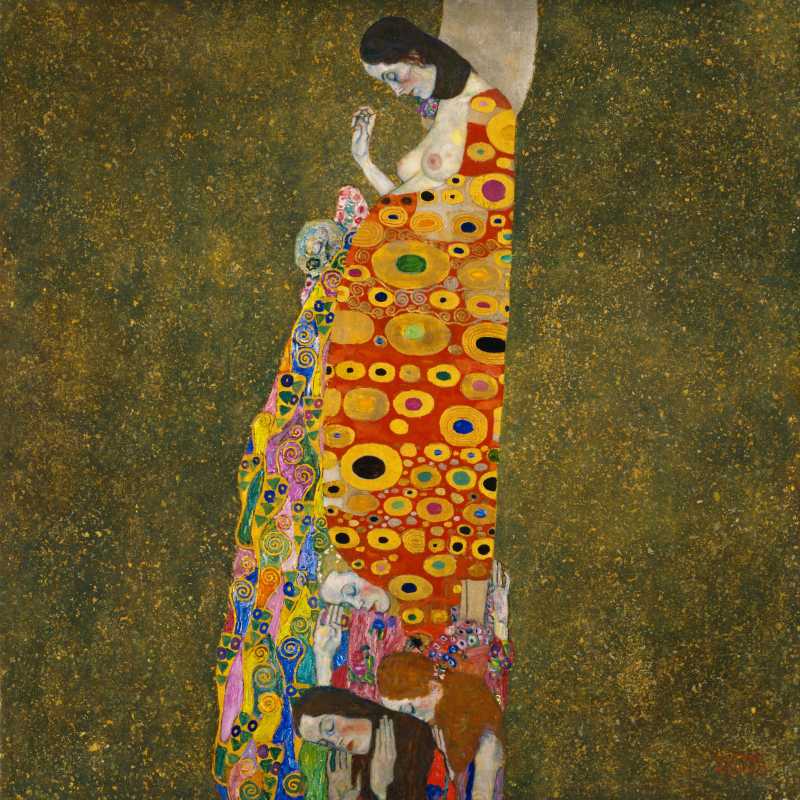
“Hope, II,” oil, gold, and platinum on canvas, by Gustav Klimt, 1908.
You look forward to marriage and want yours to be the holiest and happiest possible. Thus you are preparing yourself now by practicing self-control, by acquiring the virtue of purity.
—from 20th-Century Teenagers, by “A Friend of Youth,” St. Paul Editions, © 1961
You gave up chocolate for Lent but it didn’t take. You aren’t good at saying no. To hamburgers on a Friday. Glasses of pale beer at a college party where none of his friends guess you’re only sixteen. You’re a wild girl. A hungry girl. Hungry girls want everything.
You want to see everything. Stars and elephants, titan footprints, dinosaurs, meteors, galaxies expanding, spilled milk and moondust cupping the horizon like the hand that cups your breast. Your gauzy peasant blouse slipping from one bare shoulder as he kisses lower, lower, on the dark balcony of his off-campus apartment with the whole world watching. No one is looking, he whispers. Mr. and Mrs. America are in bed, they’re watching Johnny Carson, and you think of the pamphlet your mother gave you, the boy and girl in a lover’s lane, arms reaching for each other, but they can’t touch because Jesus sits between them in the car. Jesus in the picture is shiny and half-invisible, like a jellyfish you don’t see until it stings. You could pop him like a soap bubble if you put your hand through, and you do. Too late to stop now, you think, and three months later, bent over the bowl, stomach hitching, you know it’s too late for everything. Woodstock this summer, he’d said. Europe, later, but now he won’t take your calls and the nuns say what your mother says: Why buy the cow?
You’re a cow in in a barn with bile-green walls, the home for girls who should have known better. Girls who come fat and leave skinny, nothing in their arms but a suitcase. Babies signed away to the church, to a fine family who’ll bring them up right.
Daily Mass. Mopping floors, washing dishes. Food so bland and boiled and beige girls fight over smuggled-in ketchup packets. Sometimes people get away. A girl whose boyfriend showed up late one night with a ring: they all tell that story. Another girl, with bedsheets: an ambulance driving away slowly, siren off. And Sheila, who swallowed soap so they’d have to take her to the hospital. Hospital doors aren’t locked, the girls say.
The girls say: carry low, a boy it’ll be; carry high, a girl you’ll see. The nuns say: You’ll get what you get. What God wills. You know you’ll have a girl. A girl who will someday imagine a thousand lives for the mother she never knew: truck stop waitress, call girl, party girl, runaway bride; bored housewife, teenage alcoholic, Bonnie to someone’s Clyde.
You imagine your daughter only one way. Free.
You put your hand against the window glass. It ripples like a jellyfish Jesus. Like a vow, so easy to break.
Kathryn Kulpa is the author of the flash chapbooks Cooking Tips for the Demon-Haunted, forthcoming from New Rivers Press, and Girls on Film (Paper Nautilus). Her work has appeared in Atticus Review, Flash Frog, Five South, and Smokelong Quarterly, and has been chosen for the Wigleaf longlist and the Best Microfiction anthology.



